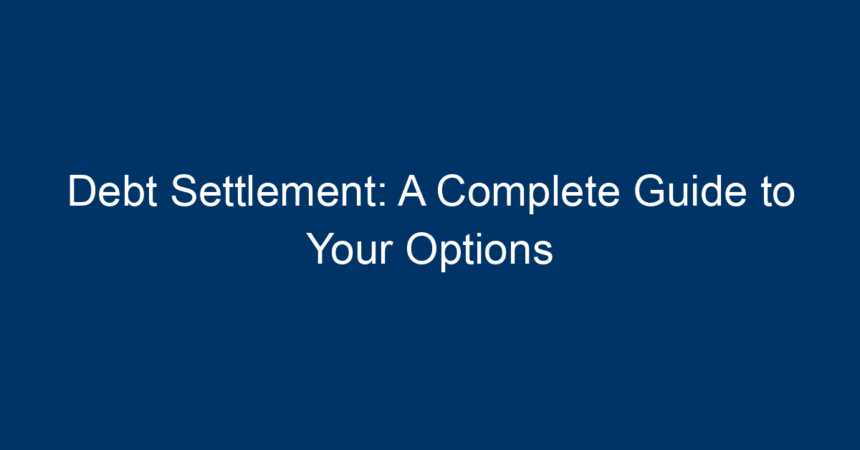In today’s uncertain economic climate, millions of individuals find themselves overwhelmed by mounting debts. If you’re struggling to keep up with payments or feeling the weight of financial burdens, debt settlement may offer a viable solution. In this comprehensive guide, we’ll delve into what debt settlement is, the options available to you, the pros and cons, and actionable steps to get started on your path to financial freedom.
What is Debt Settlement?
Debt settlement is a negotiation process where borrowers work with creditors to reduce the total amount owed on their debts. Instead of paying off the full balance, you may settle for a lower lump sum payment. This is often viable when debts are severely delinquent, typically in collections where creditors would otherwise receive no repayment.
Understanding How Debt Settlement Works
The process usually involves hiring a debt settlement company or negotiating directly with creditors. Here’s a breakdown of how it typically works:
-
Analyze Your Financial Situation: Start by assessing your debts, income, and expenses to understand your financial standing.
-
Choose a Strategy: Decide whether you’ll hire a professional debt settlement company or handle negotiations yourself.
-
Negotiate: Once a strategy is in place, begin negotiating with creditors to arrive at a settlement amount that is mutually agreeable.
-
Make Payments: After reaching an agreement, pay the settlement amount by the deadline.
- Receive Confirmation: Ensure you receive written confirmation from the creditor that the debt is settled, which will be crucial for your records.
Types of Debt Eligible for Settlement
While many types of debt can be settled, the most commonly negotiated debts include:
-
Credit Card Debt: This is the most prevalent form of unsecured debt and often offers substantial leverage in negotiations.
-
Medical Bills: Given the rising cost of healthcare, medical debts can be settled at a lower rate.
-
Personal Loans: These may also be settled, particularly if they are unsecured.
- Collections Accounts: Debts already in collections are often ripe for negotiation.
Types of Debt Not Typically Settled
Not all debts are suitable for settlement. Consider the following:
-
Secured Debts: Mortgages and car loans, where the lender has collateral, are difficult to settle, as the lender can recover through repossession.
-
Federal Student Loans: These often have specific repayment programs that may not involve settlement but offer other options for forgiveness or reduced payments.
- Tax Debts: While possible to negotiate with the IRS, it requires different procedures than traditional debt settlement.
The Pros and Cons of Debt Settlement
Like any financial strategy, debt settlement comes with its advantages and potential drawbacks.
Pros
-
Reduced Total Debt: One of the most significant benefits of debt settlement is that it allows you to pay less than what you owe.
-
Avoid Bankruptcy: For many, this approach is a preferable alternative to filing for bankruptcy, which can have long-lasting effects on credit history.
- Negotiation Flexibility: Many lenders are open to negotiations, making it a realistic option for many.
Cons
-
Credit Score Impact: Debt settlement can negatively affect your credit score, as creditors will report settled amounts as “paid for less than owed.”
-
Fees: Many debt settlement companies charge fees, which can cut into any savings you realize from settlement.
- Tax Consequences: The IRS considers forgiven debt as taxable income, which could have implications for your tax return.
How to Negotiate Your Debt Settlement
If you opt for negotiating your debt yourself, here’s how to approach the process:
Gather Documentation
Compile all relevant documents, including account statements, letters from creditors, and personal financial statements. This information will serve as leverage in negotiations.
Research Your Debt
Understand who your creditors are and what you owe. Research typical settlement amounts for similar debts to establish a baseline for negotiations.
Reach Out to Creditors
Start with a phone call to your creditors. Be polite but firm and express your intent to settle your debts. Clearly state what you can offer and request a settlement amount.
Document Everything
Keep records of all conversations, agreements, and payments. Clear documentation will protect you in case of disputes.
Review Settlement Offers
If creditors present settlement offers, assess them carefully before accepting. Make sure the proposed amount aligns with your financial situation and what you can afford.
Alternatives to Debt Settlement
If debt settlement is not the right fit for you, consider these alternatives:
-
Debt Management Plans (DMPs): These involve working with a credit counseling agency to create a repayment plan. DMPs can help you achieve lower interest rates without settling.
-
Debt Consolidation: This combines multiple debts into one loan with a lower interest rate, simplifying payments.
- Bankruptcy: As a last resort, bankruptcy may relieve you of debts but will affect credit ratings for years.
Actionable Insights: Steps to Take Today
-
Evaluate Your Debts: List all debts, amounts owed, and terms. This is your foundation for negotiations.
-
Calculate Your Budget: Determine how much you can realistically allocate towards settlement by evaluating your monthly income and expenses.
-
Educate Yourself: Research debt settlement options, companies, or local non-profits that can help you navigate the process.
-
Reach Out for Help: If necessary, consult with a financial advisor or credit counselor to guide you through the negotiation process.
- Be Persistent: If your first settlement proposal is denied, don’t be discouraged. Many creditors expect negotiations and may reconsider with further talks.
Conclusion
Debt settlement can be a powerful tool for gaining control over crippling financial struggles. By understanding your options, weighing the pros and cons, and taking proactive steps, you can create a solid plan for negotiating your debts. Remember, while debt settlement can lighten your financial load, it’s essential to consider all available options based on your unique situation. Begin your journey to financial freedom today with informed decisions and a commitment to reclaiming your financial health.
By incorporating the strategies outlined above, you can navigate the complexities of debt settlement and make significant strides toward a more secure financial future.



